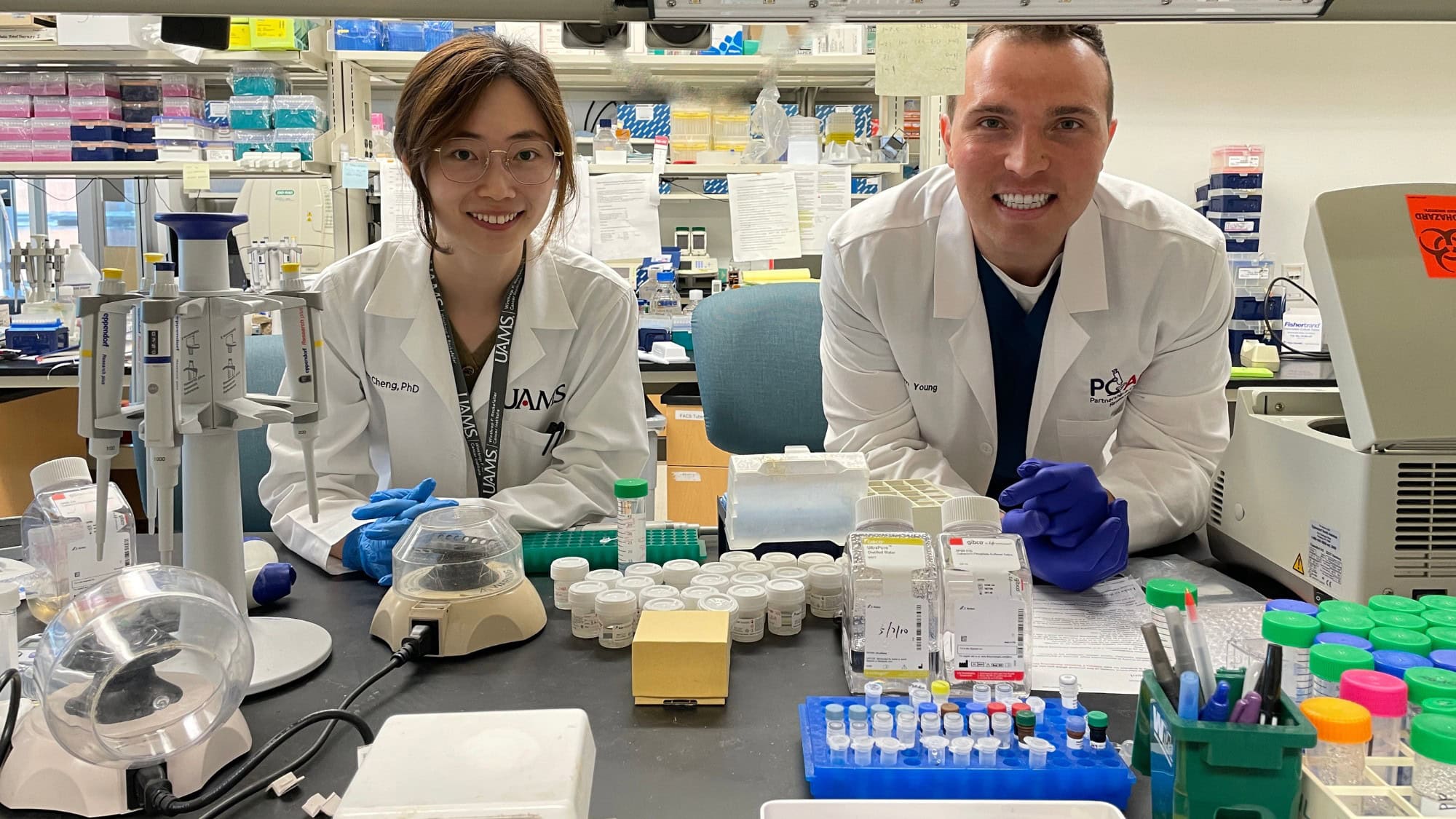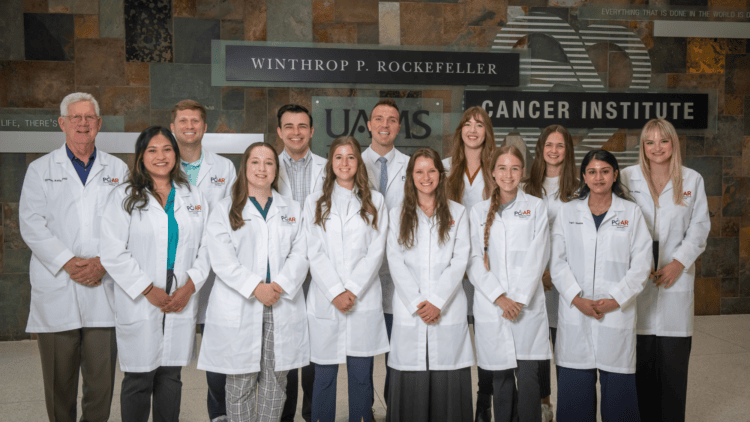Cancer Institute Internship Program Prepares Students for Careers in Oncology
| To meet the cancer care needs of the future, the UAMS Winthrop P. Rockefeller Cancer Institute is working to strengthen its research and training programs to produce the next generation of cancer researchers and oncologists.
One of the institute’s training programs that’s generating enthusiasm among medical students is the Partnership in Cancer Research (PCAR) summer internship, now in its fourth year at UAMS. Funded by a $780,005 grant from the National Institutes of Health (NIH), the paid internship offers students who have completed their first year of medical school the chance to participate in an eight-week cancer research and oncology training experience. Up to 12 students are selected each summer.
Tom Kelly, Ph.D., associate director of Cancer Research and Training for the Cancer Institute, runs the program, along with program manager, Diane McKinstry. Kelly is also a professor of pathology in the UAMS College of Medicine.
“Arkansas has a high cancer burden, and a pressing need exists for more medical students to pursue oncology as a career,” said Kelly.
Though most interns come from UAMS, the internship is open to students nationwide. The program also selects one student each from the Arkansas College of Osteopathic Medicine in Fort Smith and the New York Institute of Technology College of Osteopathic Medicine in Jonesboro.
Based on feedback from the first two years of participants, PCAR is succeeding in steering students to oncology. In a survey of 2023 interns, 75% said they plan to become clinical oncologists. All students said they are likely to pursue cancer research as part of their career after participating in PCAR, as opposed to only 58% before participating.
Brandyn Young, an intern in the 2024 PCAR class, is proof. The internship experience has solidified his decision to become a urologic oncologist and continue his involvement in cancer research. A cancer survivor, Young has approached the experience with an intense motivation and compassion.
“It is so exciting to get to offer now from a research and clinical viewpoint the kind of hope that physicians offered me when I was diagnosed with cancer.”
Young said he had the opportunity to work on some of the most innovative research happening at UAMS while working in the myeloma research laboratory of Frank Zhan, Ph.D., research director for the world-renowned UAMS Myeloma Center.
The Zhan laboratory is working on two cutting-edge research projects to cure multiple myeloma, including one with TRIP13, a protein that is uniquely overexpressed in resistant strains of multiple myeloma. A highlight for Young was being in the lab for the ‘blot result,’ indicating the successful knockout of TRIP13 in multiple myeloma cells.
“TRIP13 is like the quarterback of the opposing multiple myeloma cancer cell team. So, if this research is successful in clinical trials, multiple myeloma patients will soon have a “sacked” TRIP13 and their cancer in remission,” Young said.
“I’m very pleased that Brandyn came to me this summer and joined my experiment,” said Yan Cheng, Ph.D., an instructor working in the Zhan lab. “He brings in questions, and I also improve a lot while talking with him so I know how a medical student would look at the research in their way.”The involvement of top UAMS cancer researchers who serve as mentors is a big draw for the students.
“We select faculty from a pool of 48 UAMS faculty members who are active cancer researchers, many of them funded by the National Cancer Institute,” said Kelly.
2024 PCAR mentors include Jia Liu, Ph.D.; Donghoon Yoon, Ph.D.; Samantha Kendrick, Ph.D.; Fenghuang “Frank” Zhan, Ph.D.; Marie Burdine, Ph.D.; Ruud Dings, Ph.D.; Kimberly Stephens, Ph.D.; Amit K. Tiwari, Ph.D.; Ping-Ching Hsu Ph.D.; Fen Xia, M.D., Ph.D.; Brian Koss, Ph.D.; and Antinio Allen, Ph.D.
Since the program began, PCAR interns have co-authored six scientific publications that have appeared in Scientific Reports, International Journal of Molecular Biology, Cureus, Endocrinology and Oncotarget.
In addition to working with a UAMS cancer researcher on an individual project in basic science, clinical or community-based research, students attend weekly seminars on such topics as basic science of carcinogenesis, cancer biology and cancer immunology through current clinical treatments of surgery, chemotherapy and radiation, and cutting-edge strategies of liquid biopsy.
Students report on their research progress in an interactive “Live from the Lab!” series and assemble a final poster presentation describing their findings. Other activities include participation in a moderated cancer-patient support group online, a palliative care clinic visit, and “Death Over Dinner” event, a creative end-of-life discussion led by the UAMS Palliative Care Team.
PCAR also makes use of the state-of-the-art UAMS Health Simulation Center for hands-on simulations of breast cancer detection, biopsy and interactions with standardized patients.
“The great thing about this program is that is has clinical experiences for students who want to be oncologists combined with laboratory experience for students who are more interested in research. In cancer care, patients need both — oncologists working side by side with researchers to translate new findings into the clinic,” said a former intern in a survey response.
The internship program is also an important component of all NCI designation, a mark of excellence the Cancer Institute is working to achieve.
“Every designated cancer center has a cancer research education and training core that is charged with building the pipeline of future cancer researchers,” said Kelly.
“We are always working to improve the program, but we know we’re giving students the experiences they need to understand the lifesaving impact they can have and how much their talents are needed,” said Kelly.

